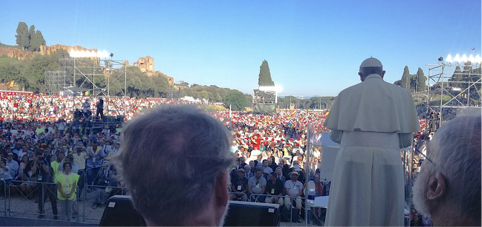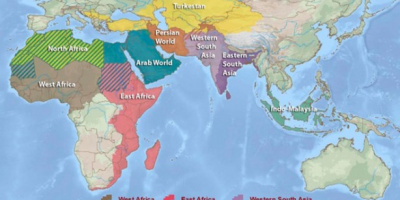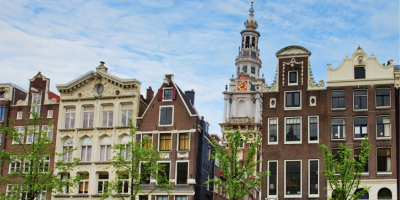In the midst of terrorist attacks, the return of alpha male leaders and the undermining of the current world order, Pentecost is a sign of hope of what the Holy Spirit will yet do in our world.
Despite widespread secularisation, Pentecost Monday is still a public holiday in many European nations. However, most Europeans today probably don’t know what the occasion commemorates.
Most Christians could tell us that it was the day when the Holy Spirit was poured out on the 120 disciples meeting in the Upper Room, fifty days after the Passover Sabbath.
Fewer however could describe the Jewish Pentecost as a harvest festival celebrated seven weeks after the beginning of the harvest. Hence the names Feast of Harvest (Exodus 23:16) and Festival of Weeks (Exodus 34:22). From the Passover Sabbath to the Pentecost Sabbath, we count ‘fifty days’ (Lev. 23:16). Hence the name Pentekoste, from the Greek, meaning ‘fiftieth day’.
Yet another name for this festival is the Feast of First Fruits (Numbers 28:26), a religious offering of the first agricultural produce of the harvest. It implied there was more to come.
So when Peter stood up on the day of Pentecost to explain to the crowd in Jerusalem that what they were witnessing was what Joel had prophesied, obviously he meant this was just the beginning, the First Fruits of more to come.
The partial fulfilment of this promise of Joel was the promise of the complete fulfilment: that the Spirit would be poured out on all peoples. All peoples.
Waves
Thirty years ago I read a book that has shaped my view of history and of the future ever since. Published under the Calvinistic label of Banner of Truth Trust, The Puritan Hope (by Iain Murray) described the expectation of seventeenth-century Puritans for successive waves of renewal and spiritual awakening, catalysed by prayer, to continue around the world until God’s purposes were fulfilled. The Puritans faced the future with hope–in spite of the little progress made to that date in global mission.
In our day there is much evidence of the spread of God’s church worldwide. Since that day in Jerusalem, the Spirit has been poured out on many peoples indeed. Too often however we have lost sight of the Puritan hope.
Yet the twentieth century surpassed all other centuries for the outpouring of the Spirit. On the one hand, last century could be described as the worst in history–with two world wars, the atom bomb, the holocaust, countless millions killed by leaders like Lenin, Stalin, Hitler, Pol Pot and Mao Zedong.
On the other, more people came into the kingdom of God last century than in all the previous nineteen centuries. It was the century of the Spirit! The greatest revivals in history so far happened last century: the Pentecostal movement began at the start of last century; revivals occurred in Africa, Latin America and Asia; and the emergence of the church in China was surely one of the greatest surprises of the century.
Dreams
The Charismatic movement brought renewal to mainstream Protestant churches beginning in the 1960’s. My family was involved in the very beginning of this charismatic movement in New Zealand. My father, a Baptist elder, led a prayer meeting every Friday night in our home that was packed with people from across our city from all denominations. When Catholics too began being ‘filled with the Spirit’ and calling themselves Pentecostal Catholics, our horizons were being truly stretched beyond our denominational prejudices and our wildest dreams!
This weekend Pope Francis invited several hundred Pentecostal and evangelical leaders to join some 30,000 Catholic charismatics in celebration of the 50th anniversary of the Catholic charismatic renewal. The photo above was taken by my friend and YWAM colleague Bruce Clewett from the podium. The pope told the crowd at the ancient Roman Circus Maximus that the charismatic renewal was an ecumenical ‘current of grace’. It was born ecumenical, he said, because it was the Holy Spirit who created unity, drawing Catholics and Pentecostals together to profess that Jesus is Lord and to proclaim together the Father’s love for all his children.
God hasn’t finished yet. There is still much pouring out of the Spirit on all peoples yet to happen. Could what is beginning to happen among Muslim peoples eventually ‘provoke the Jew to jealousy’, as Paul writes in Romans 11:14?
C.H. Spurgeon asked ‘why we should not have a greater Pentecost than Peter saw, and a Reformation deeper in its foundations and truer in its upbuildings than all the reforms which Luther or Calvin achieved? We have the same Christ, remember that. The times are altered, but Jesus is the Eternal.’
As we look to the future, we can do so with expectation of how the Spirit will yet surprise us.
This is the Puritan hope, the hope of Pentecost.
Till next week,



